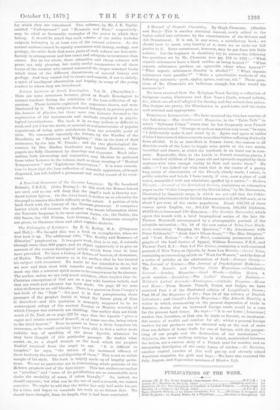PERIODICAL LITERATURE.—WO have received the October number of the following
:—Tho Gentleman's Magazine, in the "Table Talk" in which " Sylvanns Urban" states that he has frequently seen French children intoxicated. "Strange as such an assertion may seem," be says, " I deliberately make it, and stand by it. Again and again at tables d' h6to I have seen children scarcely more than babies suffering distinctly from alcohol. It is, as travellers in France know, the custom in all districts south of the Loire to supply wino gratis at the two meals, breakfast and dinner, at which the residents in an hotel eat in com- pany. Repeatedly, then, in the hotels in French watering-places, I have watched children of five years old and upwards supplied by their mothers with wine enough, visibly to flush and excite them." Be adds :—" I can indeed say with truth that in the course of a pretty long series of observations of the French, chiefly made, T admit, in public vehicles and hotels, I have rarely, if over, seen a glass of cold water, unqualified with any admixtime, quaffed by a native."—Modern Thought.—Journal of the Statistical Society, containing an exhaustive paper on the "Celtic Languages in the British isles," by Mr. Rnvonstein, illustrated by linguistic maps, in which wo are told that the Celtic- speaking inhabitants of the British Isles amount to 2,185,890 souls, or to abmit 7 per cent. of the entire population. About 456,735 of them cannot speak English, viz., 304,110 Welshmen, 103,562 Irishmen, 48,878 Scotchmen and 190 Manxmon.—The Scottish Naturalist, which opens this month with a brief biographical notice of the late Sir Thomas Moncrieff, accompanied by a photographic: portrait of the scientific naturalist.--,No. 18 of the new series of Tales from Black- wood, containing "Rapping the Question," "My Adventures with Peter Schlemihl," "Aunt Ann's Ghost-Story," "The Blue Dragoon," and " Lord Hatton."–=Men of Mark, containing permanent photo- graphs of the Lord Justice of Appeal, William Bowman, F.R.S., and Thomas nod, R.A.—Part 4 of The Etcher, contaiuiug a well-executed portrait of Miss Terry as Ophelia, by Anna Lea Merritt.—Social Notes, containing an interesting article on " Work for Women," and the first of a series of articles on the adulteration of food.—Science Gossip.— The Journal of Science.—The Journal of Psychological Medicine.— The St. James's and Charing Cross Magazines.—Chambers, Tourna1.—Sunday Magazine.—Good Words.—Golden Hours, a good number.—Sanshine.—The Ladies' Gazette of Fashion.— Weldon's Ladies' Journal.—Kensington.—Catholic Progress.—House and Home.—From Messrs. Cassell, Potter, and Galpin we have received Part 4 of the illustrated edition of Longfellow's Poems; Part 18 of the Magazine of Art ; Part 54 of the Library of English Literature ; and Cassell's Family Magazine.—The Atlantic Monthly, a, writer in which, commenting on the present depression of trade in America, denies that an increased foreign trade would be a cure for the present hard times. Ho says :—" It is our home [American] market that furnishes, or that can be made to furnish, an inexhaust- ible source of wealth and comfort for all ; whilst•a general foreign market for our products can be obtained only at the cost of more than ten dollars of home trade for one of foreign, with the pauper- ising of our people and the destruction of our institutions."— Rollo-aria, the most striking articles in which, sandwiched between the fiction, are a curious story of a. French trial for murder, and an interesting description of the early forms of cricket.--St. Nicholas, another capital number of this well got-up and cleverly edited American magazine for girls and boys.—We have also received the July, August, and September numbers of Mission Life.
































 Previous page
Previous page